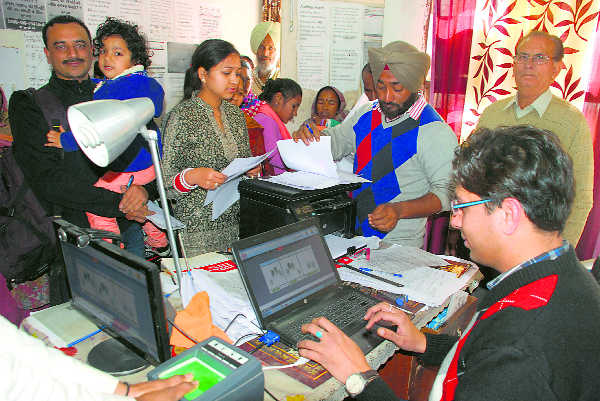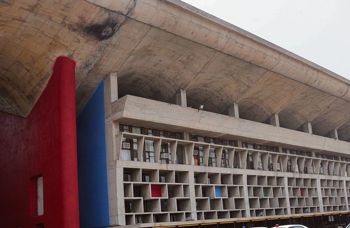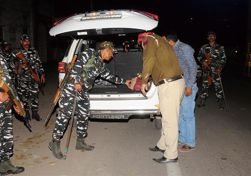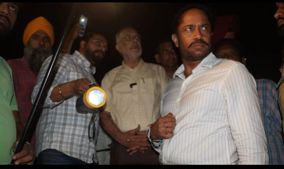
Freedom vs Welfare: Aadhaar subscribers at a centre. Is the Aadhaar programme a breach of privacy, informational autonomy and bodily integrity?
Anjali Bhardwaj
IN a landmark judgment, the right to privacy has been upheld to be a fundamental right by a nine-judge bench of the Supreme Court of India. Personal liberty is fundamental to democracy. Privacy is critical to enable people to exercise their basic rights, including the freedom of thought, speech, expression and association, among others. The right to privacy also encompasses an individual's right to be left alone, that is essential to protect against arbitrary intrusion by the state. Unfettered infringements would inevitably have a chilling effect on free speech, critical thought, dissent and public participation — the cornerstones of a democratic society. An important aspect in the evolving debate on privacy, when viewed from the lens of public accountability, is the balancing of an individual's right to privacy and peoples' right to information. Where the boundary is drawn, has been a matter of public debate and litigation. In this context, it is pertinent to note that the judges seem to be of the unanimous view, that like any other fundamental right, the right to privacy is not an absolute right and is subject to reasonable restrictions, including protection of legitimate state interest or public interest.
The principle of public interest is also recognised in the Right to Information (RTI) Act. While section 8 (1) (j) of the law exempts disclosure of “personal information … which would cause unwarranted invasion of the privacy of the individual”, it is subject to at least three exceptions under which such information can be disclosed: If the information sought is in larger public interest, if it relates to a public activity or if the information is such that it cannot be denied to the Parliament or state legislature. In fact, Section 8(2) of the law states that notwithstanding any of the exemptions listed in Section 8 of the Act, access to information may be allowed, if public interest in disclosure outweighs the harm to the protected interests. Experience with implementation of the RTI Act, however, has shown that there has been an unfortunate tendency to deny information on various critical matters citing privacy concerns —including assets and liabilities of public servants and evaluation of their professional performance; information relating to examinations and selections; and information on educational degrees. In each of these cases, there is great public interest in disclosure of information. One of the few recognised ways that a public servant can be convicted for corruption, under the Prevention of Corruption Act 1988, is if his or her assets are disproportionate to known sources of income. Given the high levels of corruption among government functionaries in India, it is clearly in public interest to ensure that information on assets and liabilities of government servants and their spouses and dependants is disclosed publicly to help fight the war against corruption.
Having access to information regarding performance appraisals of government officials would be in public interest as it would enable citizens to know whether the best-performing, and hence the most-deserving public servants are getting promoted and occupying sensitive and critical positions, or are other, less-deserving public servants being favoured, for the wrong reasons.
Similarly, given recent scams relating to the selection of teachers in Haryana and the Vyapam scam in Madhya Pradesh regarding selection of various categories of professionals like doctors, there is growing public concern about the integrity of the examination and selection systems. The Supreme Court had to directly intervene in the examinations leading to entry into medical colleges and even set up a committee headed by a retired Chief Justice of India to oversee the process. Making public information relating to examinations and selections is clearly in larger public interest as it would assuage public suspicion or expose, and help correct, malpractices.
In a country like ours, where institutions of probity and accountability are largely ineffective in controlling the morass of corruption, experience with the RTI law has shown that it is critical for people to have access to relevant information in order to empower them to participate in the fight against graft.
It is hoped that this judgement will help expound the balance which adjudicators need to strike while protecting an individual's right to privacy on the one hand and public interest on the other, especially in matters relating to public accountability.
The writer, an RTI activist, is associated with the National Campaign for People's Right to Information.



























